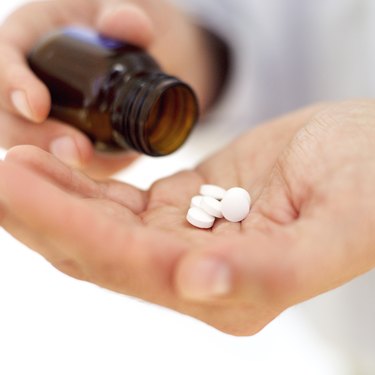
When you have heartburn -- a painful, burning sensation behind or below the breastbone -- you might be quick to blame it on something you ate. But persistent or frequent heartburn that disrupts your well-being or daily life might be more than a matter of your diet. This condition, known as gastroesophageal reflux disease, or GERD, can sometimes be brought on or made worse by medications. One such class of medications is calcium channel blockers, or CCBs. Because untreated GERD can cause serious medical problems, it's important to determine whether medications like CCBs might be a contributing factor.
How CCBs Might Contribute to GERD
Video of the Day
Reflux describes the escape of stomach contents upward into the esophagus, the tube connecting the mouth to the stomach. Normally, this is prevented by a muscular ring at the bottom of the esophagus called the lower esophageal sphincter, or LES. Some medications -- including CCBs -- can cause LES relaxation, allowing escape of stomach contents into the esophagus.
Video of the Day
CCBs are commonly used to treat high blood pressure, or hypertension. These medications act on smooth muscle cells in blood vessels, causing them to relax, thereby lowering blood pressure. The LES is also composed of smooth muscle cells similar to those in blood vessels. Because of this, CCBs have the potential to cause LES relaxation and new or worsening reflux symptoms.
Likelihood of Reflux or GERD With CCBs
Reflux is a well-known potential side effect of CCBs. A clinical study published in the July 2007 issue of the "British Journal of Clinical Pharmacology" found that more than 35 percent of people with no previous history of acid reflux developed reflux-related symptoms when they began using CCBs. The researcher also found that more than 45 percent of people with preexisting reflux reported worsening of their symptoms with CCB usage. Notably, the likelihood of new or worsening reflux is more common with some CCBs than others. The likelihood of reflux symptoms also tends to increase along with the dosage of the CCB.
Next Steps
Talk with your doctor if you develop new or worsening reflux while taking a CCB. Your doctor might switch you to a different CCB that is less likely to affect the LES. Because hypertension can be treated with other classes of medications that do not seem to be associated with GERD, your doctor may suggest another type of drug, such as an ACE-inhibitor like ramipril (Altace) or lisinopril (Prinivil, Zestril). Your doctor might also recommend an over-the-counter or prescription medication to neutralize or reduce stomach acid.
Lifestyle changes, such as avoiding trigger foods and not eating too close to bedtime, might reduce your bouts of heartburn. Maintaining a healthy weight is also important. If your heartburn occurs frequently at night, elevating the head of your bed sometimes helps.
Warnings and Precautions
Consult with your doctor if you experience frequent or worsening reflux, but do not alter the dosage or stop taking your CCB medication unless your doctor specifically advises you to do so. Contact your doctor right away if your reflux is accompanied by difficulty swallowing, weight loss or vomiting.
Heartburn symptoms sometimes mimic or overlap with those of a heart attack. Seek immediate medical attention if you experience chest pain that typically feels more like a tight, crushing pain that may radiate to the neck or arm, especially if it's accompanied by shortness of breath, sweating, dizziness or fainting.
Medical advisor: Jonathan E. Aviv, M.D., FACS
- Circulation: Trends in Antihypertensive Medication Use and Blood Pressure Control Among United States Adults With Hypertension
- British Journal of Clinical Pharmacology: Do Calcium Antagonists Contribute to Gastro-oesophageal Reflux Disease and Concomitant Noncardiac Chest Pain?
- New Developments in the Management of Benign GI Disorders: Medical Treatment of Achalasia
- World Journal of Gastroenterology: Effects of Anti-hypertensive Drugs on Esophageal Body Contraction
Is this an emergency? If you are experiencing serious medical symptoms, please see the National Library of Medicine’s list of signs you need emergency medical attention or call 911.